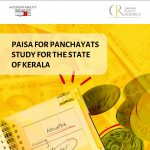
The Case of the Missing Records
3 August 2012
If you have ever visited a government office, you would have been astounded (like I was) to see numerous files stacked in dingy offices, gathering dust. Yet, there often appeared to be a method to the madness and if you requested for a file, it was easily pulled out.
Despite this, in recent years there seems to be growing number of cases where records go “missing”.
I first became aware of this “strange” phenomenon when we started working on the PAISA Project. As you all must be aware by now, through the PAISA Project we analyse government documents at different levels (Government of India (GOI), state and district) and complement that with school-level surveys in order to ascertain the following: How do funds flow through the system? Is money utilised? When is it utilised and how are funds spent?
We have received a decent “success rate” in gaining access to documents at the GOI, state and district levels. With the exception of a few stray cases where the relevant authority at the district level was transferred along with access to all the important documents at the district level (we were told that only he had the password and without the password, the new official was unable to access any of the documents), if the data exists, it has been given. (Data not existing at all is another problem altogether and more details on that are available here.)
However, the greatest number of issues seems to come about at the school level. During our surveys, we request to see passbooks, registers, utilisation certificates and cashbooks. Interestingly, we seem to have encountered numerous cases of “passbooks being stolen”, “passbooks lost in floods”, cashbooks “burnt” in kitchen fires!
This got me wondering…Was the inability to get records the fault of our surveyors (i.e., did we not ask the question correctly, did our surveyors not probe enough, etc.), or was it something deeper? Preliminary research suggests that in recent years, the frequency of these cases being reported (probably due to the greater use of the Right to Information (RTI) Act and rising citizen engagement with government records) has increased. So here are some of the stories:
- In February 2012, Lokayukta Justice Manmohan Sarin asked for all records from the Delhi Government’s Urban Development Department relating to a case on an unauthorised colony in Wazirpur village. The village had been allegedly granted illegal provisional regularisation certificates by the then urban development Minister, ahead of the 2008 assembly elections. In the complaint, it had been alleged that the land was issued based on forged and incomplete applications and the provisional certificate had been signed by the Minister. The result: the Lokayukta was informed that the file regarding the colony could not be traced “despite all efforts”!
- In March 2012, an RTI application requested records from the Prime Minister’s Office (PMO) pertaining to the imposition of the Emergency in India in 1975. The PMO’s office however stated, “a thorough search was made to retrieve, trace records of correspondence between the then Prime Minister and the President of India relating to proclamation of emergency. However, no such records were found in the PMO (Prime Minister’s Office).”
- It is hard to put a date to the missing records in the Adarsh Society housing scam. The Adarsh Society, originally meant to be a six-storey structure to house Kargil war heroes and war widows, was converted into a 31-storey building, violating a number of laws. The flats were allotted to bureaucrats, politicians’ relatives and defence officers at artificially lower prices. Between 2010 and 2012, there have been more than four instances of crucial documents going missing. The first entailed important file notings dating August 30, 2009 and November, 1, 2010, going missing from Maharashtra’s Urban Development Department office. This was subsequently followed by important papers “disappearing” from the Ministry of Environment and Forests. Another set of papers went missing from the Army Headquarters in Mumbai. In June 2011, maps and some survey sheets from 1872-1960 related to Adarsh land were untraceable from the land records office of the Mumbai. According to a recent Indian Express article, the Central Bureau of Investigation (CBI) has hit a roadblock in its investigations to look for the missing records and is currently weighing the options of closing the investigations.
- A similar problem was faced during the auditing of the National Rural Health Mission (NRHM) scheme in Uttar Pradesh by the Comptroller and Auditor General’s office. The report states that “in many cases during the course of the audit, it was informed that records were either not available in full or not available at all and in quite a few instances, original records had not been maintained, particularly relating to Accounts.” For instance, records from the Director General, National Programmes, Monitoring and Evaluation from 2005-06 to 2006-07 amounting to Rs. 1277 crores were not available. Even at the district level, records from 2005-06 to 2008-09 related to medicine and equipment purchase, utilisation certificate and stock position in two Community Health Centres in Lucknow were not traceable. Similarly, cashbooks, ledgers, passbooks, tender, quotation and purchase files, bill registers, stock and voucher book from April 2005 to December 2006 for the Reproductive and Child Health-II and from April 2005 to August 2008 for the Routine Immunization Programme in Kanpur Nagar, Uttar Pradesh were also missing. (more details available here)
These are just some of the bigger examples that have come to light in the recent past in relation to “missing” records containing valuable information (and interestingly, often in relation to scams!).
In fact, according to the Public Cause Research Foundation (PCRF) which had analysed orders passed by various information commissioners at the national and state level – in many cases government officials had refused to provide information sought under an RTI application, due to “missing documents.” According to a member of the PCRF, “during 2010, Information Commissioner Shailesh Gandhi, who handles Departments pertaining to Delhi, had received as many as 30 such cases and ordered filing FIRs in 28 cases.” (Hindustan Times, February 2011).
Moreover, in a significant Judgement, the Division Bench of the Hon’ble High Court of Jharkhand, has held that, in cases where a department is required to keep a record but it is not available or missing, then it should be reconstructed. It is also “within the jurisdiction of the authorities under the Right To Information Act to direct the office to reconstitute the record…” (link to the judgement available here).
Insistence on filing FIR’s immediately upon theft/destruction and reconstruction of lost records are just some steps to ensure greater accountability. However, the question still arises as to who is held accountable if valuable records go missing and how do we ensure that the “reconstruction” itself is accurate. In this day and age of digitisation and cloud storage, it feels strange that often the lack of records is the main hindrance in ensuring due process and accountability. In fact, I am reminded of my days of college where the crashing of a hard drive just before submission of papers was not reason enough to ask for an extension. Instead, you had to deal with the consequences. As more and more such cases come to light, it feels like time has come to remove the “dust” from the files and figure out a better system of maintaining records such that the person who claims its loss/destruction is held accountable for it.





